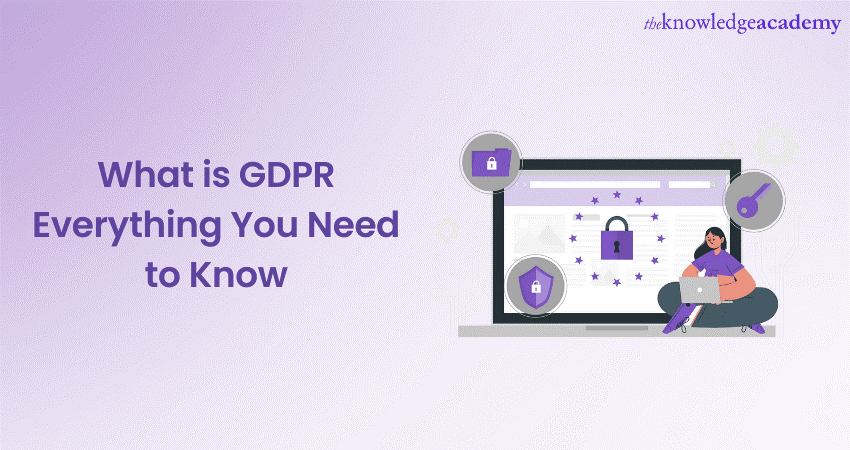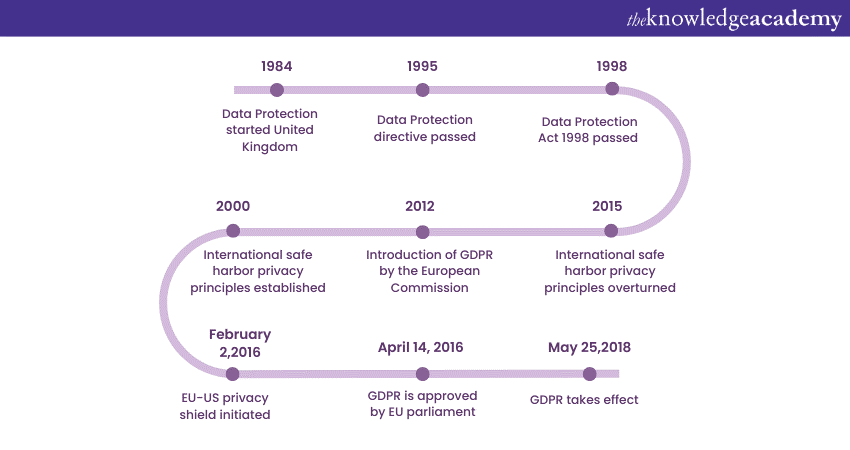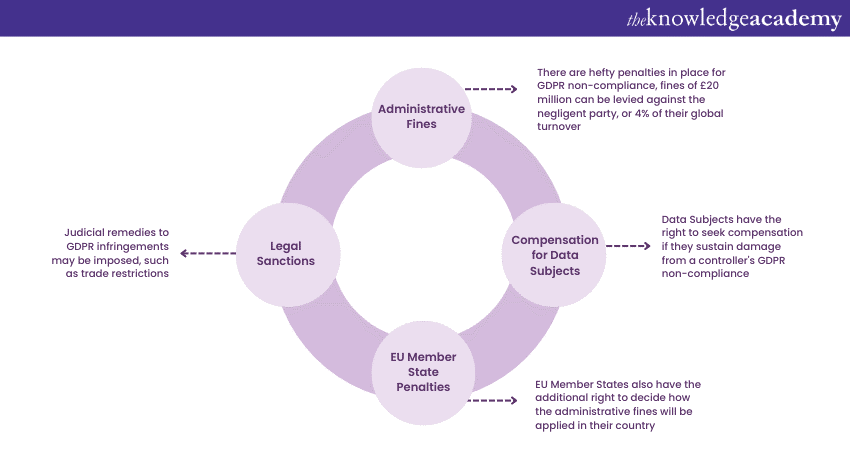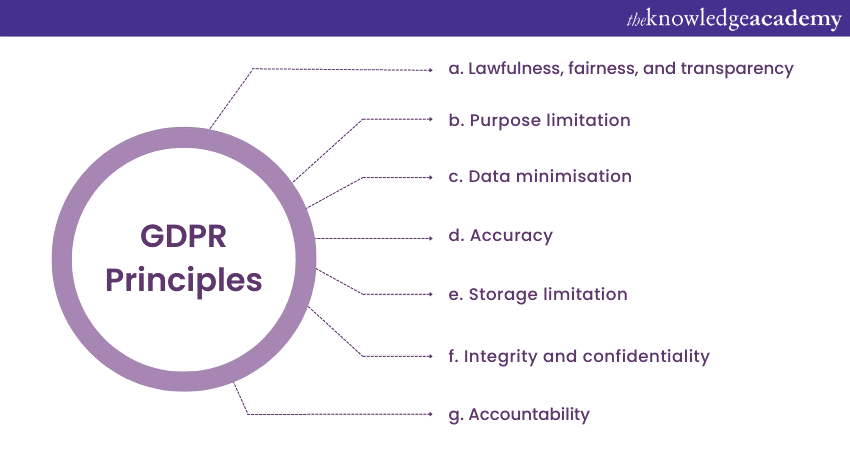We may not have the course you’re looking for. If you enquire or give us a call on +27 800 780004 and speak to our training experts, we may still be able to help with your training requirements.
Training Outcomes Within Your Budget!
We ensure quality, budget-alignment, and timely delivery by our expert instructors.

A commonly asked question by organisations and individuals looking to achieve in the data protection and privacy industry is What is GDPR? It is the General Data Protection Regulation, a comprehensive Data Protection Law that came into effect in the European Union (EU) on May 25, 2018.
The goal of the GDPR is to give individuals greater control over their personal data while also promoting greater transparency and accountability in how organisations collect and use that data. There’s more to learn about this Data Protection Law and discover and why it matters.
So, read our comprehensive blog to get an overview of What is GDPR and the impact it has on businesses and individuals. Read ahead to learn more!
Table of Contents
1) What is GDPR?
2) History and evolution of GDPR
3) GDPR scopes and penalties
4) GDPR breaches
5) GDPR applies to whom?
6) GDPR principles
7) New GDPR consumer rights
8) What does GDPR mean for the future?
9) Understanding GDPR compliance
10) How to prepare for GDPR compliance?
11) Conclusion
What is GDPR?
GDPR is a new regulation passed by the EU in 2016 which came into existence on May 25,2018. It is designed to provide citizens of the EU with greater control over their personal data. It ensures that the information is being securely protected across Europe by imposing strict rules on organisations that collect, process, and store their personal data. The Data Protection Directive of 1995 was replaced by the GDPR because it was considered insufficient in light of substantial technological improvements and the broad use of personal data in the current digital era.
The GDPR and data protection act strengthen people's rights over their data, placing more robust regulations on how businesses must gather, use, and store personal data, and sets severe penalties for violations. No matter where the organisation is headquartered, it must comply with the GDPR if it processes the data of people living in the European Union. The global impact of this rule has forced businesses worldwide to make significant adjustments to their data protection practices and policies, often incorporating regular GDPR audits to maintain compliance.
Additionally, benefits of GDPR has significant advantages, which help protect individuals' privacy and personal data while promoting innovation and growth in the digital economy. Let’s look at some of its benefits:
a) Enhanced data security
b) Accountability and responsibility
c) Improved privacy rights
d) Increased transparency
e) Stronger data protection
f) Greater control over personal
g) Prevents unauthorised access and data misuse
h) Data integrity
i) Improved data quality
j) A global standard for data protection
History and evolution of GDPR
To replace the outdated Data Protection Directive of 1995, the European Union (EU) initiated the GDPR. The rapidly evolving digital environment and the rising volume of personal data being gathered, processed, and shared by businesses, organisations, and governments gave rise to the necessity for GDPR.
By giving EU citizens more control over their personal data and setting stricter laws on the organisations that manage it, the GDPR was developed to improve and standardise data protection for EU citizens. The regulation established standards for collecting, using, storing, and destroying personal data. It also specified procedures for disclosing data breaches and seeking consent before processing personal data. The EU officially adopted it in 2016, and it became enforceable on May 25, 2018

GDPR scopes and penalties
Your personal data can heavily suffer from a lack of regulations. Under these circumstances, an organisation is left to use it as it pleases. However, GDPR controls this by making the financial regulator attack businesses that do not conform to ethical guidelines with hefty penalties. The scope, and penalties of GDPR are as follows

Scope
The Scope of GDPR applies to organisations that are within European Union (EU) as well as organisations which operate the personal data of EU residents.The scope of GDPR regulations extends to a different data type, such as name, location, email id’s, financial information, and health records. This leads to accountability when it comes to handling personal data in different sectors.
Penalties
An organisation can be imposed heavy fines if it does not deal with personal data carefully. Organisations handling personal data must abide by a set of laws and regulations mandated by the GDPR. Violations or any form of non-compliance to these regulations are subject to fines and other penalties.
An organisation may face fines and other penalties if it is determined that it has violated the GDPR. A GDPR breach carries a maximum penalty of €20 million, or 4% of the organisation's annual global revenue, whichever is higher. In the UK, Information Commissioner’s Office (ICO) decides on fines for breaking Data Protection Laws. Any money collected goes back to the government.
The GDPR states that more minor breaches can result in penalties of up to £10 million or 2% of the company's worldwide revenue. Serious breaches can be fined up to £20 million or 4% of the company's global turnover. Before the GDPR, the ICO could only fine up to £500,000.
The severity of the breach and the organisation's cooperation level with authorities affect the exact fine amount. Enterprises may also face other penalties, such as legal action from individuals whose data has been breached or reputational damage. Therefore,They must take serious steps to ensure compliance with GDPR Requirements
GDPR breaches
When an organisation disregard one or more GDPR regulations, it is considered a GDPR Breach. These breaches include accessing any personal data unlawfully, not implementing proper security measures or compromising the safety of personal data. Here are a few examples to help you understand what is a GDPR breach:
1) Lack of sufficient consent for the collection and use of personal data.
2) Failure at safeguarding personal information and unauthorised access prevention.
3) Denial of access or the ability to update or delete, personal data.
4) Failure to promptly inform people and authorities when a data breach happens.
GDPR applies to whom?
Any person or business that collects, stores and processes the personal data of EU citizens must comply with the GDPR, regardless of where the processing takes place. As a result, companies based outside of the EU are subjected to the GDPR if they provide services or goods to or monitor the behaviour of EU individuals.
There are some specific categories of sensitive personal data that equire strong protection. A person's genetic information, biometric data, health information, political ideas, religious beliefs, trade union membership, and information regarding their sexual life or orientation are all examples of personal data. Additionally, there are two different types of data handlers in GDPR: Data Processors and Data Controllers. They are explained in detail below:
a) Data Processors: Individuals or organisations that process personal data on behalf of Data Controllers are known as Data Processors. They can include marketing firms, cloud service providers, and IT service providers.
b) Data Controllers: The people or organisations that choose the objectives and tools for processing personal data are known as Data Controllers. This can apply to commercial enterprises, non-profit groups, and governmental bodies.
Become familiar with the principles of data protection and how they apply to personal data by signing up for our Certified EU General Data Protection Regulation (EU GDPR) Practitioner Course today!
GDPR Principles

There are seven key GDPR Principles which serve as a guide to data handling. Let’s talk about them in detail:
a) Lawfulness, fairness, and transparency: Individuals must be informed about the processing activities and their rights, and personal data must be treated in a fair, lawful, and transparent manner.
b) Purpose limitation: Personal data cannot be further processed in a method that is inconsistent with the original, stated, and legal purposes for which it was gathered.
c) Data minimisation: Personal information must be sufficient, relevant, accurate and kept to a minimum required for processing purposes.
d) Accuracy: Personal information must be accurate and kept current, and all necessary steps must be taken to guarantee that errors are fixed or deleted.
e) Storage limitation: When it is no longer required, personal data must be safely destroyed or anonymised. It must not be retained for longer than is necessary.
f) Integrity and confidentiality: Personal data processing must be done in a secure manner that protects it against accidental loss, unauthorised or unlawful processing, destruction, or damage, among other risks.
g) Accountability: Organisations are accountable for adhering to GDPR, which includes maintaining records of processing operations, putting in place suitable security measures, and proving compliance when authorities ask for it.
Learn lawful processing of personal data, subject access requests and how to deal with them with the Certified EU General Data Protection Regulation (EU GDPR) Foundation Course today!
New GDPR consumer rights
The GDPR has updated the regulations regarding their data, as it is mentioned in the rights of the data subject, article 12 to 23 in Chapter 3. The term data subject refers to people of EU who trust an organisation with their personal data. These rules focus on the well-being of the data subjects, keeping it safe and defended from malicious reach of external attacks. Some of these rights are as follows:
1) Article 13-14 (The right to be informed): In this article GDPR states that the data should always be transparent for the data subjects. It also states the data subjects should be well informed about the collection of their data as well as its uses.
2) Article 15 (The right to access): GDPR establishes the means for individuals to check their personal data if they choose to access it. This allows individuals to check the purpose of the data collected Additionally, any organisation under EU is bound by the law to provide this data if the data subject requests it, without any cost.
3) Article 16 (The right to rectification): Rectification in this article refers to an individual's ability to check if their data is correct or not. In case the data is not correct the subject is free to ask an organisation utilising their data, to make changes it. This extends to incomplete data, where an individual can ask an organisation to add the remaining information. GDPR mandates the rectification of the data on the earliest notice, and any organisation has a time limit of one month to correct this data.
4) Article 17 (The right to erasure): This segment of the updated rights allows users to delete their data which was utilised by an organisation. This deletion can be requested if the data is not relevant any more or subjects take back their consent regarding the usage of data. Organisations are not allowed to withhold the data from deletion and this regulation extends to all third parties which might have used or benefited from the collected data.
5) Article 18 (The right to restrict data processing): GDPR allows a people under the protection of EU to choose how their data is processed. If the subjects discover the usage of their data is unlawful or they have objection to the way their data is processed, they have the right to restrict the processing. Data subjects are required to notify the third parties who are involved with this data, about this request as well under certain circumstances.
6) Article 20 (The right to data portability): This segment of the GDPR article mandates the organisation to provide data relevant to the user in a coherent format. This data should be portable enough that another organisation should be able to easily use it (if necessary). Due to the regulations implemented by GDPR, an organisation cannot prevent the data subject from sharing this information with other organisations.
7) Article 21 (The right to objection): This segment of the GDPR article states that subjects have the right to object against the usage of their data. If people, whose data has been collected by an organisation, find objection the way their data is being processed, for instance for direct marketing purposes, they can object against it. According to the regulations of GDPR, EU based organisations will have to abide by the objection if they believe the reason of the objection is valid.
8) Article 22 (Automated individual decision-making): GDPR regulations mandate that people should not suffer by any means due to automated decision- making and profiling of their data. This regulation is applicable to all automated processing of data which may affect an individual in a legal manner.
What does GDPR mean for the future?
GDPR has significantly changed how data and personal information is perceived by EU organisation. As regulations like these keep refining themself overtime, misuse or abuse of such data will become tougher with time. As a result, organisation and business who understand the essence of ethical data usage and privacy protection, will get higher preference in future.
There is no doubt business and organisations across the world ae thriving on data in the current age. This data allows them to conduct predictive analytics on the potential customer and future trends, thus making a larger profit than they could otherwise. However, this vital data which is collected can also be used for malicious and unethical intents.
Despite the potential of malicious usage of customer data, GDPR has shown that with correct regulations, this probability can be lowered. The EU regulator have the means and method to make sure the organisation that benefit from the data establish a data protection model. This enhanced security is bound to keep the people safer, and their data well defended against potential misuse.
One can say that it is too soon to draw a conclusion on how the future of GDPR rights will turn out. However, as times are changing the need for well- protected business models which keeps the data collection subjects safe, are becoming common. This is true for not just EU regions but also people outside it, such as USA.
There is a possibility that EU based GDPR model will become so popular that it may get accepted across various parts of world. Overall, it will lead to a safer and more transparent use of data with passage of time. This kind of data model is bound to make people safer, enabling greater cooperation from them.
Interested in the laws protecting the privacy of people around the world? Why not try our Data Protection act Training today!
Understanding GDPR compliance
Understanding GDPR compliances has become a mandatory aspect of many organisations. It is one of the most significant privacy-based laws implemented in the past few years. Why is gdpr important, to different organisations, as failing to abide by them can make them susceptible to penalties. These penalties generally come with hefty fines and as a result they act as a potential deterrent for any company to misuse the data.
The essence of complying with GDPR is based on the thought of protecting a person’s vital information and thus protecting the person’s fundamental right. This compliance has led to an overall more ethically guided approach to data handling in the EU- based organisations. As a result of this mandated privacy standard, data protection has become much more accessible for a large majority of people across the EU.
This compliance became prominent and started to take a foothold due to rising concerns regarding the use of personal information. This compliance can be credited to the technical revolution that took place over last few years. This compliance to data protection is a successor for Data Protection Directive established previously.
The GDPR Compliance is particularly applicable to a certain set of companies and organisations that meet certain criteria. These companies need to strictly comply with the regulations if they do not wish to be penalised, or worse considered to have breached GDPR. Some of the factors which can decide if an organisation or company is bound to comply with GDPR or not are as follows:
1) EU based operation: Any organisation operating within the EU region is directly under the GDPR laws. Hence if they are dealing with a form of data which may include health, biometrics, cookies, Internet Protocol (IP) address and race of the individual, they need to abide by GDPR regulations.
2) Data of EU residents: This applies for companies who are operating outside EU grounds but are handling the data of people who reside in EU region. Any company or organisation that operates with such data is bound by GDPR regulations and compliance.
3) Employee count: An organisation that asks for the personal information of its employees is bound by GDPR in terms of how their vital data is handled. This is particularly for an organisation that has over 250 people working under the firm. This compliance not only keeps the resident safe but also the employee and their confidential information.
4) Frequency of data processing: Although EU based rules and regulations are applicable for large scale organisation and a business that operate within EU, GDPR is not limited there. GDPR compliance is also applicable for any organisation which may process sensitive information provided by citizens of EU region. Even if the company is not directly responsible for obtaining the data, how they handle it is still controlled by GDPR rules.
Interested in making an organisation more GDPR compliant? Try our Dealing With Subject Access Requests (SAR) - An Executive Briefing Course!
How to prepare for GDPR compliance?
The GDPR law emphasises "privacy by design," which means that all departments in a company must carefully examine their data and how they use it. To be GDPR compliant, companies need to take many actions. If you're starting your GDPR compliance journey, there are some steps you can start with:
Data Mapping
To prepare for GDPR compliance and improve Customer Relationship Management (CRM), it is essential to map out where all personal data in your business comes from and document how the data is used. This includes identifying where the data is stored, who can access it, and any risks to the data. Doing this lets you understand how personal data is used within your organisation and take steps to protect it.
Eliminate unnecessary data
To comply with GDPR, keeping the necessary information and removing unused data is essential. If your company has gathered excessive data that doesn't provide real value, evaluating which data is critical for your business is important to comply with the regulations. GDPR encourages companies to handle personal data with more care.
During the clean-up process, it's essential to ask yourself questions such as:
a) Consider why you are storing data instead of deleting it
b) Why are you keeping specific data?
c) What is the purpose of collecting certain personal information?
d) Whether it's better to delete the data instead of encrypting it
Answering these questions will help you decide what data to keep and what to remove.
Implement data protection measures
To comply with GDPR, companies must protect personal data by implementing measures like encryption, access control, and monitoring. Encryption converts data into a coded format which is accessible only to authorised users nd limits control over access of personal data. Monitoring helps identify potential security breaches quickly. These measures safeguard personal data and prevent data breaches, which can damage a company's finances and reputation.
For example, a company encrypts its customers' data when the data is stored on its servers. They could also limit access to this data to only authorised employees using access control measures. Additionally, they could set up monitoring systems to quickly detect and respond to any potential security breaches. These measures help ensure the data's confidentiality, integrity, and availability and protect it from unauthorised access or misuse.
Revaluate your documentation
Reviewing documentation is an important step in preparing for GDPR compliance, and it involves a thorough examination of a company's policies and procedures related to personal data. It should be prepared in the following manner:
a) To verify all the personal data that the company collects and processes.
b) Policies and procedures related to personal data should be reviewed, including privacy policies and data protection protocols.
c) Lastly, a plan should be developed to implement any necessary changes to the company's policies and procedures to ensure GDPR compliance.
Developing GDPR policies and procedures
Having discussed the eight rights of GDPR, developing GDPR policies and procedures for individuals to deal with certain situations effectively is also an essential step which includes:
a) It involves the creation of guidelines and protocols that outline how a company handles personal data.
b) Developing policies for handling personal data involves creating clear and concise guidelines that outline the processes for data collection, storage, processing, and sharing.
c) It also involves developing a data breach response plan, a subject access request process, and a data portability process.
By developing these policies and procedures, companies can ensure they are correctly handling personal data and are prepared to meet GDPR guidelines in the event of a data breach or other related issues.
Learn to handle sensitive and personal data with our Personal Data Protection Bill Training today!
Conclusion
We hope that after reading this blog you have understood everything What is GDPR, what it is for. Eventually, the implementation of GDPR has put the control of personal data back into the hands of individuals, giving them more rights and protections over their information. Thus, it is crucial for businesses to understand the implications of GDPR and take the necessary steps to comply with its regulations. By doing so, they can not only ensure compliance with the law, but also build trust and credibility with their customers by demonstrating their commitment to protecting personal data.
Want to keep up with the data protection practices in the ever-changing digital landscape? Then, our GDPR Training is designed specifically for you.
Frequently Asked Questions
Upcoming IT Security & Data Protection Resources Batches & Dates
Date
 Certified EU General Data Protection Regulation (EU GDPR) Foundation and Practitioner
Certified EU General Data Protection Regulation (EU GDPR) Foundation and Practitioner
Sat 25th May 2024, Sun 26th May 2024
Mon 8th Jul 2024
Sat 14th Sep 2024, Sun 15th Sep 2024
Mon 23rd Sep 2024
Mon 18th Nov 2024
Sat 7th Dec 2024, Sun 8th Dec 2024
Mon 13th Jan 2025
Mon 3rd Mar 2025
Mon 14th Apr 2025
Tue 27th May 2025
Mon 14th Jul 2025
Tue 26th Aug 2025









 Top Rated Course
Top Rated Course



 If you wish to make any changes to your course, please
If you wish to make any changes to your course, please


